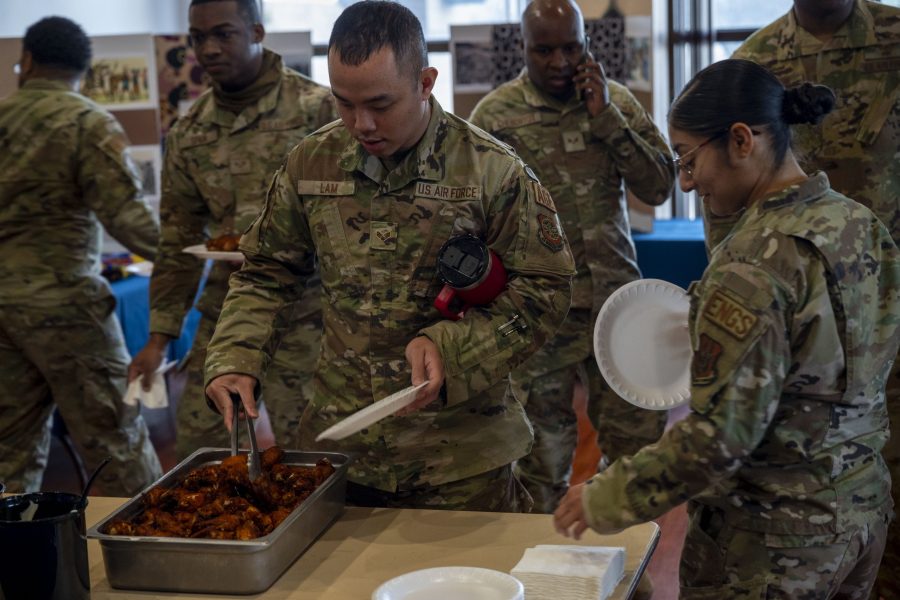Top lawmakers on the House Armed Services Committee indicated they will make pay for junior enlisted service members a key part of their work on the 2025 National Defense Authorization Act—echoing and strengthening a push from service enlisted leaders like Chief Master Sergeant of the Air Force JoAnne S. Bass for a targeted pay raise.
HASC chair Rep. Mike Rogers (R-Ala.), ranking member Rep. Adam Smith (D-Wash.) and Quality of Life Panel leaders Rep. Don Bacon (R-Neb.) and Rep. Chrissy Houlahan (D-Penn.) mentioned the pay issue in a letter to President Joe Biden this week arguing for more resources in the fiscal 2025 budget to enhance service members’ quality of life.
Bacon and Houlahan, both Air Force veterans, have held hearings and visited bases over the last eight months as their parties’ leaders on the quality of life panel. Just last month, they hosted a hearing in which the military’s top enlisted leaders urged lawmakers to address pay issues and upgrade dorms, among other issues.
Issues with compensation and housing were both cited in the lawmakers’ letter as top findings by the quality of life panel.
“Military compensation, particularly for junior enlisted, continues to grow incongruent with civilian and officer pay, resulting in food insecurity economic insecurity with escalating negative impacts on recruiting and retention expected,” the representatives wrote.
The focus on pay for junior enlisted is one shared by Bass, who has made Airmen’s compensation one of her top priorities during her last few weeks in the seat. At the AFA Warfare Symposium last week, she called for a targeted pay raise instead of the standard, across-the-board raise. Her counterpart in the Space Force, Chief Master Sergeant John F. Bentivegna has also stressed the need to reevaluate the compensation model.
Compensation problems are further compounded by inflation, as highlighted by the Military Officers Association of America last year. The MOAA pointed out that with the rising cost of living in recent years, many service members are “finding it increasingly difficult to afford housing, food, and other basic necessities.”
In 2007, pay grades E-5 through E-8 and warrant officers got a targeted pay raise. There was another targeted pay raise for midgrade and senior enlisted in 2004. The junior enlisted ranks have not had a targeted pay raise in that time.
In addition to asking for more resources in the President’s 2025 budget request, the lawmakers also noted in their letter that they “plan to place renewed focus on caring for our service members and their families” in the 2025 NDAA, which sets policy and authorizes funding
The letter also addressed concerns regarding aging and poorly maintained barracks and single-family housing, where many junior enlisted members are required to reside. This issue was underscored by a Government Accountability Office report in September, which revealed degraded living conditions in military housing with issues such as mold, pest, water quality problems, and overcrowded rooms, affecting troops’ mental and physical health. Earlier this month, the Air Force announced it was investing $1.1 Billion in dorm upgrades.
Challenges in accessing medical care, particularly behavioral health services, is another problem highlighted in the letter. A National Institutes of Health publication cited a research revealing that depression accounts for up to 9 percent of all ambulatory military health network appointments.
In December, the GAO outlined its recommendations regarding TRICARE’s behavioral health coverage for mental health and substance use disorders. GAO found that the Defense Health Agency had not comprehensively assessed whether the services were meeting their goals for the past seven years, and recommended DHA regularly measure its progress towards improving behavioral health coverage and address any discrepancies.
The lawmakers also highlighted the issue of child care, particularly a shortage of child care workers, which they said “detracts from readiness,” as well as continued licensure problems affecting military spouses’ job prospects, worsening their economic stability and overall well-being.
While acknowledging the substantial cost involved, the lawmakers underscored the need to prioritize the welfare of the troops and their families, framing it as both a moral obligation and crucial for national security. The representatives highlighted “an alarming erosion of military quality of life,” warning of risks to the all-volunteer force if the issues are not promptly addressed.

